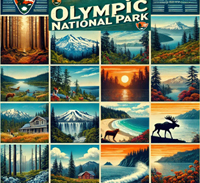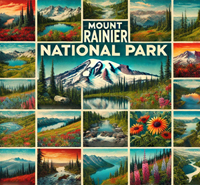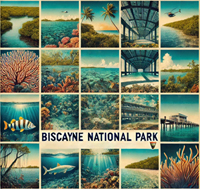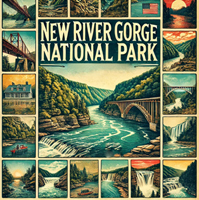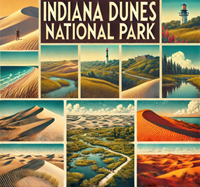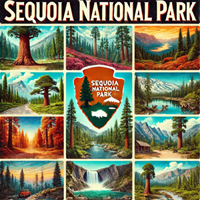
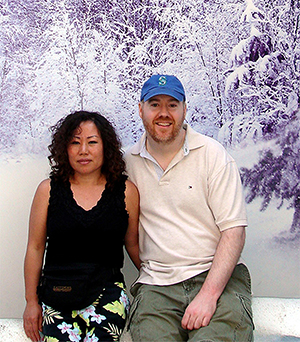
Embark on a journey curated by seasoned explorers William and Hui Cha Stanek, who have spent decades immersing themselves in the diverse landscapes of North America. These itineraries are more than just travel plans - they are thoughtfully crafted adventures designed to help you connect with the natural world, discover hidden gems, and create lasting memories.
National Parks Index | US Itineraries Index | American Roadtrips Index

Bring home a Bugville Critters book and watch as your child's love for reading and learning grows with every page. Hand-painted illustrations bring the heartwarming stories to life. Ask your librarian to add Bugville Critters to the library's digital collection today!
Discover William Stanek's Exclusive Art Collection
Explore and purchase the stunning art featured on this site. Own a piece of William Stanek's unique and captivating artwork today!
(May 2, 2025) 3-Day Adventure Through The Fire and Water of Northern California: Lassen Volcanic National Park and Burney Falls
Introduction: A Journey Through Fire and Water
Personal Story: William's Encounter with California's Wild Landscapes
The first time I ventured into Lassen Volcanic National Park, I was immediately struck by the raw and untamed beauty of this volcanic landscape. The park is a geological wonder, filled with steaming fumaroles, bubbling mud pots, and towering peaks shaped by ancient eruptions. As I hiked through the park, I was constantly reminded of the powerful forces that have shaped our planet. I remember standing at the edge of Bumpass Hell, the park's largest hydrothermal area, watching the steam rise from the boiling springs and feeling the heat radiate from the ground beneath my feet. It was a humbling experience, a reminder of the earth's incredible power and the ever-changing nature of our world.
A short drive from Lassen Volcanic National Park took me to Burney Falls, a place that felt like the polar opposite of the volcanic landscape I had just explored. The falls, often described as one of the most beautiful waterfalls in California, cascade 129 feet down into a lush, moss-covered basin. The contrast between the fiery landscape of Lassen and the serene beauty of Burney Falls was striking. As I stood there, mesmerized by the sound of the rushing water and the vibrant greenery surrounding the falls, I felt a deep sense of peace and connection to nature. These two places, though so different, are a perfect pairing for an adventure that showcases the diverse beauty of Northern California's wild landscapes. In this guide, Hui Cha and I will share our experiences exploring Lassen Volcanic National Park and Burney Falls, along with our favorite hikes, photography spots, and insider tips to help you make the most of your visit.
About Lassen Volcanic National Park
Lassen Volcanic National Park, located in Northern California, is a unique and dynamic landscape shaped by the forces of fire and ice. The park is home to all four types of volcanoes – shield, composite, cinder cone, and plug dome – and is one of the few places in the world where you can see them all in a single park. The park's centerpiece is Lassen Peak, the largest plug dome volcano in the world, which last erupted in 1915. Today, the park is a haven for hikers, photographers, and nature lovers, offering a wide range of activities from exploring hydrothermal areas like Bumpass Hell to hiking through lush forests and alpine meadows. Whether you're scaling the heights of Lassen Peak, walking through a bubbling geothermal landscape, or simply soaking in the serene beauty of the park's lakes and forests, Lassen Volcanic National Park offers an unforgettable experience of California's wild and rugged beauty.
About Burney Falls
Burney Falls, located in McArthur-Burney Falls Memorial State Park, is one of the most beautiful and iconic waterfalls in California. The falls are fed by underground springs, which keep the water flowing year-round, even during the dry summer months. The water cascades 129 feet down into a turquoise pool surrounded by lush, moss-covered rocks and ferns. The falls are often described as the "Eighth Wonder of the World," and it's easy to see why. The sound of the rushing water, the cool mist rising from the falls, and the vibrant greenery surrounding the basin create a serene and magical atmosphere. Whether you're hiking the trails around the falls, picnicking by the river, or simply standing at the overlook, taking in the beauty of the falls, Burney Falls offers a peaceful and rejuvenating escape in the heart of Northern California.
Day 1: Exploring Lassen Volcanic National Park
Morning: Sunrise at Manzanita Lake and Summit Lake Exploration
6:00 AM - Start at Manzanita Lake
Overview: Begin your adventure at Lassen Volcanic National Park with a tranquil sunrise at Manzanita Lake. The serene waters of the lake perfectly mirror the towering Lassen Peak, creating an ideal setting for early morning reflection and photography. Afterward, take a leisurely drive to Summit Lake, another gem of the park, where you can explore the pristine shoreline and enjoy a peaceful morning hike.
Tips from William: "Manzanita Lake is one of the most photogenic spots in the park, especially at sunrise when the reflections are crystal clear. Bring a wide-angle lens to capture the full scene and don't forget your tripod for those perfect long-exposure shots. Summit Lake, less crowded than Manzanita, offers a peaceful retreat with stunning views of the surrounding peaks."
Insights from Hui Cha: "After enjoying the sunrise at Manzanita, Summit Lake is a great next stop. The trail around the lake is easy and flat, making it accessible for all visitors. The cool morning air and the calm waters create a serene atmosphere that's perfect for a relaxing walk."
How to Access Manzanita Lake and Summit Lake
Location: Manzanita Lake is located near the northwest entrance of Lassen Volcanic National Park. Summit Lake is about a 30-minute drive south of Manzanita Lake along the park road.
Directions: From the northwest entrance, follow the main park road to Manzanita Lake. After exploring the area, continue south on the same road to reach Summit Lake.
Exploration Details: Both lakes are easily accessible from the parking areas. Manzanita Lake has a flat, easy trail that loops around the lake, while Summit Lake offers short trails along its shore, with opportunities for swimming, picnicking, and birdwatching.
Photography Techniques:
- Reflections: Capture the reflections of Lassen Peak in both lakes. The still waters in the morning provide perfect mirror images.
- Wildlife: Keep an eye out for birds, deer, and other wildlife that frequent the areas around the lakes.
- Macro Photography: Use a macro lens to capture close-ups of wildflowers, insects, and the details of the forest floor.
Alternative Activity:
If you prefer more solitude, consider heading to Butte Lake, located in the northeastern section of the park. It's a bit more remote and offers a different perspective on the park's volcanic features.
Mid-Morning: Bumpass Hell and Kings Creek Falls Hike
9:00 AM - Hike to Bumpass Hell
Overview: After a relaxing morning at the lakes, gear up for one of Lassen's most famous hikes – the trail to Bumpass Hell. This 3-mile round trip hike will take you through a beautiful alpine landscape to the park's largest hydrothermal area, where you'll witness boiling springs, steaming fumaroles, and bubbling mud pots. Once you've explored Bumpass Hell, drive to the nearby Kings Creek Picnic Area and hike to Kings Creek Falls, a beautiful 30-foot waterfall tucked away in the forest.
Tips from William: "Bumpass Hell is a must-see in Lassen Volcanic National Park. The geothermal features are both fascinating and photogenic. Bring a wide-angle lens to capture the expansive views of the hydrothermal area, and a telephoto lens for close-ups of the bubbling springs and steam vents. The hike to Kings Creek Falls is relatively short, but the trail can be steep and rocky in places – wear sturdy shoes and take your time."
Insights from Hui Cha: "The trail to Bumpass Hell is relatively easy, but the altitude can make it feel more challenging. Take your time and enjoy the views along the way. After exploring Bumpass Hell, Kings Creek Falls offers a peaceful retreat. The sound of the rushing water and the cool shade of the forest create a perfect setting for a picnic lunch."
How to Access Bumpass Hell and Kings Creek Falls
Location: Bumpass Hell is located along the main park road, about 6 miles from the southwest entrance. Kings Creek Falls is another 10-minute drive south of Bumpass Hell.
Directions: From Summit Lake, continue south along the main park road to the Bumpass Hell trailhead. After your hike, drive a few more miles to the Kings Creek Picnic Area for the Kings Creek Falls hike.
Trail Details:
- Bumpass Hell Trail: A 3-mile round trip hike with moderate elevation gain. The trail is well-marked and maintained, leading to a boardwalk that allows you to safely view the geothermal features.
- Kings Creek Falls Trail: A 2.5-mile round trip hike with some steep and rocky sections. The trail leads to a stunning waterfall and offers beautiful views of the surrounding forest.
Photography Techniques:
- Geothermal Features: Use a wide-angle lens to capture the full scope of Bumpass Hell. The contrast between the vibrant colors of the geothermal features and the surrounding alpine landscape is striking.
- Waterfall Close-Ups: At Kings Creek Falls, use a tripod and a slow shutter speed to create a smooth, silky effect with the water.
- Forest Landscapes: The trail to Kings Creek Falls passes through dense forest – perfect for capturing the interplay of light and shadow on the trees.
Alternative Activity:
If you're looking for an easier hike, consider the Mill Creek Falls Trail near the park's southwest entrance. This 3.2-mile round trip hike takes you to another beautiful waterfall with less elevation gain.
Afternoon: Drive to Lassen's Cinder Cone and Butte Lake
1:30 PM - Explore Cinder Cone and Butte Lake
Overview: After your morning hikes, take a scenic drive to the northeastern section of Lassen Volcanic National Park to explore the Cinder Cone and Butte Lake area. The Cinder Cone, a perfectly symmetrical volcano, offers one of the most unique hiking experiences in the park. The trail to the summit is steep, but the panoramic views of the Painted Dunes, the Fantastic Lava Beds, and Butte Lake are well worth the effort.
Tips from William: "The hike up Cinder Cone is a challenging one, but the views from the top are incredible. The colors of the Painted Dunes and the contrast between the black lava and the surrounding forest are a photographer's dream. Bring a wide-angle lens to capture the expansive views and a telephoto lens for close-ups of the unique volcanic features."
Insights from Hui Cha: "The Cinder Cone hike is steep and involves walking on loose volcanic cinders, which can be tough on the legs. Take your time and bring plenty of water. Once you reach the top, the views are breathtaking, with the vibrant colors of the Painted Dunes stretching out below you. After the hike, Butte Lake offers a peaceful place to relax and cool off – perfect for an afternoon swim or a leisurely paddle."
How to Access Cinder Cone and Butte Lake
Location: Cinder Cone and Butte Lake are located in the northeastern section of Lassen Volcanic National Park, about a 1-hour drive from the park's main entrance.
Directions: From Kings Creek Falls, return to the main park road and head north towards the town of Old Station. Follow the signs to Butte Lake Road, which will take you to the trailhead for Cinder Cone.
Trail Details:
- Cinder Cone Trail: A 4-mile round trip hike with a steep ascent. The trail is well-marked, but the loose volcanic cinders can make the climb challenging. The summit offers panoramic views of the surrounding volcanic landscape.
- Butte Lake Area: After your hike, explore the Butte Lake area, where you can swim, paddle, or simply relax on the shoreline. The lake is surrounded by forest, offering a peaceful and secluded atmosphere.
Photography Techniques:
- Volcanic Landscapes: Use a wide-angle lens to capture the sweeping views from the summit of Cinder Cone. The contrast between the black lava beds and the vibrant colors of the Painted Dunes is particularly striking.
- Panoramas: The expansive views from the summit are perfect for creating panoramic images. Experiment with different compositions to capture the full scope of the landscape.
- Butte Lake Reflections: In the late afternoon, the calm waters of Butte Lake offer beautiful reflections of the surrounding trees and mountains.
Alternative Activity:
If the Cinder Cone hike feels too strenuous, consider exploring the nearby Fantastic Lava Beds. This area is less physically demanding and offers equally fascinating views of Lassen's volcanic history.
Evening: Sunset at Chaos Crags and Devastated Area
6:30 PM - Sunset at Chaos Crags and Devastated Area
Overview: Conclude your first day with a visit to Chaos Crags, a group of lava domes that rise dramatically above the surrounding landscape. The area is named for its chaotic appearance, with jagged rocks and boulders scattered across the terrain. The nearby Devastated Area, shaped by the 1915 eruption of Lassen Peak, offers another opportunity to reflect on the park's volcanic past. The sunset at these sites casts a warm glow over the rugged landscape, creating a perfect end to your day.
Tips from William: "The light at sunset is perfect for capturing the rugged beauty of Chaos Crags and the Devastated Area. The jagged rocks and boulders create interesting shadows and textures. Bring a tripod for long exposures, and experiment with different angles to capture the best light and shadows."
Insights from Hui Cha: "The Devastated Area is a peaceful place to reflect on the power of nature. The interpretive trail here is informative and offers beautiful views of Lassen Peak. As the sun sets, the area takes on a serene and almost otherworldly quality. It's a great place to end the day with a quiet walk or a moment of contemplation."
How to Access Chaos Crags and Devastated Area
Location: Chaos Crags and the Devastated Area are located near the northwest entrance of Lassen Volcanic National Park, close to Manzanita Lake.
Directions: From Butte Lake, return to the main park road and head south towards the northwest entrance. The Chaos Crags trailhead and Devastated Area are well-marked, with parking available nearby.
Exploration Details: Both Chaos Crags and the Devastated Area are easily accessible from the parking areas. The Devastated Area Interpretive Trail is a short, flat loop, while the Chaos Crags trail is a bit more rugged but offers stunning views of the surrounding landscape.
Photography Techniques:
- Rocky Landscapes: Use a wide-angle lens to capture the rugged beauty of Chaos Crags. The contrast between the jagged rocks and the soft light of sunset creates striking compositions.
- Sunset Colors: The warm, golden light of sunset is perfect for landscape photography. Use a tripod to capture the subtle colors and patterns in the sky, and experiment with different compositions to create a sense of depth.
- Volcanic Details: The Devastated Area is rich with volcanic history. Use a macro lens to capture close-ups of the volcanic rocks, ash, and plant life that have returned to the area.
Alternative Activity:
If you prefer a more elevated view for sunset, consider hiking the nearby Ridge Lakes Trail. This short but steep hike offers panoramic views of the surrounding peaks and valleys, making it a great spot for sunset photography.
Day 2: Discovering Burney Falls and Nearby Attractions
Morning: Sunrise at Burney Falls
6:00 AM - Sunrise at Burney Falls
Overview: Start your second day with a peaceful sunrise at Burney Falls. The early morning light creates a magical atmosphere as the sun's rays filter through the trees and illuminate the cascading water. The falls are fed by underground springs, ensuring a steady flow year-round, and the vibrant greenery surrounding the basin adds to the serene beauty of the scene.
Tips from William: "Sunrise at Burney Falls is a truly magical experience. The early morning light creates beautiful reflections in the water, and the mist from the falls can catch the light, creating stunning rainbows. Bring a wide-angle lens to capture the full scene, and a tripod for long exposures. The early morning is also a great time to photograph the falls without the crowds."
Insights from Hui Cha: "The trail to the base of Burney Falls is short and easy, making it accessible for all visitors. The sound of the rushing water and the cool mist in the air create a peaceful and rejuvenating atmosphere. Take your time to explore the area and soak in the beauty of the falls – it's a perfect way to start the day."
How to Access Burney Falls
Location: Burney Falls is located in McArthur-Burney Falls Memorial State Park, about 6 miles from the town of Burney.
Directions: From your accommodations, drive to McArthur-Burney Falls Memorial State Park. The falls are well-marked, with parking available near the trailhead.
Exploration Details: Burney Falls is easily accessible from the parking area, with a short trail leading to the base of the falls. The best time to visit is at sunrise when the light is soft and the views are at their most dramatic.
Photography Techniques:
- Waterfall Landscapes: Use a wide-angle lens to capture the views of Burney Falls and the surrounding forest. Look for compositions that include the falls, the turquoise pool, and the lush greenery.
- Long Exposures: The movement of the water at Burney Falls is perfect for long-exposure photography. Use a tripod and a slow shutter speed to capture the motion of the water, and experiment with different compositions to create a sense of depth.
- Close-Ups of Flora and Fauna: The area around Burney Falls is home to a variety of plants and animals, making it a great spot for close-up photography. Use a macro lens to capture the details of the ferns, moss, and animal tracks along the trail.
Alternative Activity:
If you're looking for an alternative to Burney Falls, consider visiting the nearby McCloud Falls. This trio of waterfalls along the McCloud River offers equally stunning scenery and fewer crowds.
Mid-Morning: Hike the Pacific Crest Trail and Explore Hat Creek Rim
9:00 AM - Hike the Pacific Crest Trail and Explore Hat Creek Rim
Overview: After enjoying the beauty of Burney Falls, head to the nearby section of the Pacific Crest Trail (PCT) that runs through the region. This famous trail offers stunning views of the surrounding forests, mountains, and volcanic landscapes. One of the most scenic sections is the Hat Creek Rim, where you can enjoy sweeping views of the Cascade Range and the Modoc Plateau.
Tips from William: "The Pacific Crest Trail offers endless opportunities for photography, with its diverse landscapes and expansive views. The Hat Creek Rim is particularly photogenic, with its sweeping vistas of the surrounding mountains and valleys. Bring a wide-angle lens to capture the panoramic views and a telephoto lens for close-ups of the distant peaks."
Insights from Hui Cha: "The Hat Creek Rim section of the Pacific Crest Trail is relatively flat, making it a great option for a leisurely hike. The trail offers stunning views of the surrounding landscape, with plenty of opportunities to stop and take in the scenery. Be sure to bring plenty of water and sunscreen, as this section of the trail is exposed and can get quite hot."
How to Access the Pacific Crest Trail and Hat Creek Rim
Location: The Hat Creek Rim section of the Pacific Crest Trail is located near the town of Old Station, about a 30-minute drive from Burney Falls.
Directions: From Burney Falls, drive south on CA-89 to the town of Old Station. Follow the signs to the Pacific Crest Trailhead at Hat Creek Rim.
Trail Details: The Hat Creek Rim section of the Pacific Crest Trail offers several miles of relatively flat hiking with stunning views of the surrounding landscape. The trail is well-marked and maintained, with plenty of opportunities to stop and take in the views.
Photography Techniques:
- Panoramic Views: The expansive views from Hat Creek Rim are perfect for creating panoramic images. Experiment with different compositions to capture the full scope of the landscape.
- Volcanic Landscapes: The trail offers views of Lassen Peak and other volcanic features. Use a telephoto lens to capture close-ups of the distant peaks and the rugged terrain.
- Trail Details: The Pacific Crest Trail is rich with details, from the rocky path to the wildflowers that line the trail. Use a macro lens to capture the intricate details of the trail and the surrounding landscape.
Alternative Activity:
If you're looking for a shorter hike, consider exploring the nearby Subway Cave. This lava tube offers a unique and fascinating underground experience, with a short and easy trail that takes you through the tunnel.
Afternoon: Explore McArthur-Burney Falls Memorial State Park
12:00 PM - Lunch and Explore McArthur-Burney Falls Memorial State Park
Overview: After your hike, return to McArthur-Burney Falls Memorial State Park to explore more of the park's natural beauty. The park offers several additional trails, as well as opportunities for picnicking, swimming, and fishing in the crystal-clear waters of Lake Britton.
Tips from William: "Lake Britton is a beautiful and tranquil spot for photography, especially in the afternoon when the light is soft and the reflections are clear. Bring a wide-angle lens to capture the views of the lake and a telephoto lens for close-ups of the wildlife that frequent the area."
Insights from Hui Cha: "The area around Lake Britton is peaceful and serene, making it a perfect spot for a relaxing afternoon. The park's picnic areas offer beautiful views of the lake, and the trails around the lake are easy and accessible for all visitors. After lunch, consider renting a kayak or paddleboard to explore the lake from the water."
How to Access Lake Britton and McArthur-Burney Falls Memorial State Park
Location: Lake Britton is located within McArthur-Burney Falls Memorial State Park, just a short drive from Burney Falls.
Directions: From the Hat Creek Rim, return to McArthur-Burney Falls Memorial State Park. The lake is well-marked, with parking available near the picnic areas.
Exploration Details: Lake Britton offers a variety of activities, including swimming, fishing, and boating. The picnic areas around the lake provide beautiful views and a peaceful setting for a relaxing lunch.
Photography Techniques:
- Lake Reflections: The calm waters of Lake Britton offer beautiful reflections of the surrounding trees and mountains. Use a wide-angle lens to capture the full scene, and experiment with different angles to find the best reflections.
- Wildlife Close-Ups: The area around Lake Britton is home to a variety of wildlife, including birds, deer, and fish. Bring a telephoto lens to capture close-ups of the animals in their natural habitat.
- Water and Forest Landscapes: The combination of water and forest creates beautiful compositions. Use a wide-angle lens to capture the interplay of light and shadow on the water and the trees.
Alternative Activity:
If you're looking for more adventure, consider renting a boat or kayak to explore Lake Britton from the water. The lake's clear waters and scenic shoreline offer a peaceful and picturesque setting for a paddle.
Afternoon: Explore Lassen National Forest
2:30 PM - Explore Lassen National Forest
Overview: After lunch, venture into Lassen National Forest, which surrounds Lassen Volcanic National Park. The forest offers miles of scenic drives, hiking trails, and opportunities to explore the diverse ecosystems that make up this beautiful region. Consider visiting the nearby Subway Cave or taking a scenic drive along the Volcanic Legacy Scenic Byway.
Tips from William: "Lassen National Forest is a photographer's paradise, with its diverse landscapes and endless opportunities for exploration. The Subway Cave, a lava tube formed by ancient volcanic activity, is particularly fascinating and offers unique lighting conditions for photography. The Volcanic Legacy Scenic Byway is also a great option for capturing the stunning views of the forest and the surrounding mountains."
Insights from Hui Cha: "The Subway Cave is a must-see if you're in the area. The cave is cool and dark, providing a welcome respite from the heat of the day. Be sure to bring a flashlight and wear sturdy shoes – the trail through the cave is rocky and uneven. If you prefer to stay above ground, the scenic drives through Lassen National Forest offer stunning views of the surrounding landscape."
How to Access Lassen National Forest and Subway Cave
Location: Lassen National Forest surrounds Lassen Volcanic National Park and offers a variety of scenic drives, hiking trails, and attractions. Subway Cave is located near the town of Old Station.
Directions: From Lake Britton, drive south on CA-89 towards Old Station. Follow the signs to Subway Cave or take one of the scenic drives through Lassen National Forest.
Exploration Details: Lassen National Forest offers a variety of activities, including hiking, picnicking, and exploring the volcanic landscape. The Subway Cave is a short and easy trail that takes you through a fascinating lava tube, while the Volcanic Legacy Scenic Byway offers stunning views of the surrounding mountains and forests.
Photography Techniques:
- Cave and Forest Landscapes: Use a wide-angle lens to capture the expansive views of Lassen National Forest. The contrast between the dark cave interior and the bright forest outside creates interesting compositions.
- Volcanic Features: The Subway Cave offers unique opportunities for photographing volcanic features. Use a tripod and a slow shutter speed to capture the subtle details of the cave's walls and the light filtering through the entrance.
- Scenic Drives: The Volcanic Legacy Scenic Byway offers stunning views of the surrounding landscape. Use a wide-angle lens to capture the sweeping vistas and a telephoto lens for close-ups of the distant peaks.
Alternative Activity:
If you prefer a more relaxing afternoon, consider taking a scenic drive along the Volcanic Legacy Scenic Byway. This route offers stunning views of Lassen Peak, Shasta Lake, and the surrounding wilderness, making it a great option for a leisurely exploration of the area.
Evening: Sunset at Hat Creek Overlook
6:30 PM - Sunset at Hat Creek Overlook
Overview: End your day with a sunset at Hat Creek Overlook, a scenic viewpoint that offers stunning views of the Hat Creek Valley and the surrounding mountains. The overlook is a peaceful spot to reflect on your day and take in the beauty of Northern California as the sun sets behind the mountains.
Tips from William: "Hat Creek Overlook is one of the best spots in the area for sunset photography. The warm, golden light creates beautiful compositions, with the valley and the mountains bathed in soft colors. Bring a tripod for long exposures, and experiment with different angles to capture the best light and shadows. The light changes quickly at sunset, so be ready to shoot as soon as the sun starts to dip below the horizon."
Insights from Hui Cha: "The views from Hat Creek Overlook are absolutely breathtaking, with the valley stretching out below you and the mountains glowing in the soft light of dusk. The overlook is a quiet and peaceful spot, perfect for unwinding and reflecting on your day. After the sun sets, take some time to enjoy the stillness of the valley – the night sky here is incredibly clear, with countless stars visible on a clear night."
How to Access Hat Creek Overlook
Location: Hat Creek Overlook is located along CA-89, near the town of Old Station.
Directions: From Lassen National Forest, return to CA-89 and follow the signs to Hat Creek Overlook. The overlook is well-marked, with parking available near the viewpoint.
Exploration Details: Hat Creek Overlook is easily accessible from the parking area, with a short walk to the viewpoint. The best time to visit is at sunset when the light is soft and the views are at their most dramatic.
Photography Techniques:
- Sunset Landscapes: Use a wide-angle lens to capture the expansive views of the Hat Creek Valley at sunset. A graduated neutral density filter can help balance the exposure between the bright sky and the darker landscape.
- Valley Silhouettes: The soft, golden light at sunset creates beautiful silhouettes of the mountains and the valley below. Experiment with different compositions to capture the play of light and shadow on the landscape.
- Stargazing: After the sun sets, the night sky at Hat Creek Overlook offers incredible opportunities for astrophotography. Use a tripod and a wide-angle lens to capture the stars and the Milky Way, and experiment with long exposures to create stunning images of the night sky.
Alternative Activity:
If you prefer a different perspective for sunset, consider heading to the nearby Vista Point on the Volcanic Legacy Scenic Byway. This viewpoint offers a more expansive view of the surrounding mountains and valleys, making it a great spot for panoramic photography.
Day 3: Exploring Nearby State Parks and Scenic Byways
Morning: Visit McArthur-Burney Falls Memorial State Park
6:00 AM - Sunrise at Burney Falls
Overview: Start your third day with a return visit to Burney Falls, where you can enjoy the serene beauty of the falls at sunrise. The early morning light creates a magical atmosphere, with the sun's rays filtering through the trees and illuminating the cascading water. Afterward, explore more of McArthur-Burney Falls Memorial State Park, including the trails around the park and the scenic overlooks.
Tips from William: "Sunrise at Burney Falls is a must-see, especially if you didn't catch it on your first visit. The soft morning light creates stunning reflections and beautiful compositions. Afterward, take some time to explore the park's trails and scenic overlooks – there's always something new to discover."
Insights from Hui Cha: "The area around Burney Falls is peaceful and quiet in the early morning, making it a perfect time for reflection and contemplation. The park's trails are easy and accessible, offering beautiful views of the falls and the surrounding forest. After your hike, consider having breakfast at one of the park's picnic areas, where you can enjoy the sounds of nature and the beauty of the falls."
How to Access Burney Falls
Location: Burney Falls is located in McArthur-Burney Falls Memorial State Park, about 6 miles from the town of Burney.
Directions: From your accommodations, drive to McArthur-Burney Falls Memorial State Park. The falls are well-marked, with parking available near the trailhead.
Exploration Details: Burney Falls is easily accessible from the parking area, with a short trail leading to the base of the falls. The best time to visit is at sunrise when the light is soft and the views are at their most dramatic.
Photography Techniques:
- Waterfall Landscapes: Use a wide-angle lens to capture the views of Burney Falls and the surrounding forest. Look for compositions that include the falls, the turquoise pool, and the lush greenery.
- Long Exposures: The movement of the water at Burney Falls is perfect for long-exposure photography. Use a tripod and a slow shutter speed to capture the motion of the water, and experiment with different compositions to create a sense of depth.
- Close-Ups of Flora and Fauna: The area around Burney Falls is home to a variety of plants and animals, making it a great spot for close-up photography. Use a macro lens to capture the details of the ferns, moss, and animal tracks along the trail.
Alternative Activity:
If you've already explored Burney Falls thoroughly, consider visiting the nearby Ahjumawi Lava Springs State Park. This park is accessible only by boat and offers a unique and remote experience of Northern California's natural beauty.
Mid-Morning: Explore Castle Crags State Park
9:00 AM - Explore Castle Crags State Park
Overview: After your morning at Burney Falls, head to Castle Crags State Park, located about an hour's drive west of Burney. This park is known for its dramatic granite spires, rugged canyons, and pristine wilderness. The park offers a variety of hiking trails, including the popular Castle Dome Trail, which provides stunning views of the crags and the surrounding landscape.
Tips from William: "Castle Crags is a paradise for photographers, with its dramatic rock formations and sweeping views of the surrounding mountains. The Castle Dome Trail is particularly photogenic, with its mix of granite spires, dense forests, and panoramic vistas. Bring a wide-angle lens to capture the full scope of the landscape and a telephoto lens for close-ups of the crags."
Insights from Hui Cha: "The hike to Castle Dome is challenging but rewarding, with some steep sections and rocky terrain. Take your time and enjoy the views along the way – there are plenty of places to stop and rest. The summit offers breathtaking views of the crags and the surrounding wilderness, making it a perfect spot for a picnic lunch."
How to Access Castle Crags State Park
Location: Castle Crags State Park is located about an hour's drive west of Burney, near the town of Castella.
Directions: From Burney Falls, drive west on CA-89 to the town of Castella. Follow the signs to Castle Crags State Park.
Trail Details:
- Castle Dome Trail: A 5.5-mile round trip hike with a challenging ascent. The trail is well-marked but can be steep and rocky in places. The summit offers panoramic views of the crags and the surrounding mountains.
- Vista Point Trail: If you're looking for an easier hike, consider the Vista Point Trail, a 2-mile round trip hike that offers stunning views of the crags and the Sacramento River.
Photography Techniques:
- Granite Spires: Use a wide-angle lens to capture the dramatic rock formations of Castle Crags. The contrast between the rugged granite and the lush forest creates striking compositions.
- Panoramic Views: The views from Castle Dome are perfect for creating panoramic images. Experiment with different compositions to capture the full scope of the landscape.
- Close-Ups of Rock and Vegetation: The crags are rich with details, from the rough texture of the granite to the wildflowers that grow among the rocks. Use a macro lens to capture the intricate details of the crags and the surrounding vegetation.
Alternative Activity:
If the hike to Castle Dome feels too challenging, consider exploring the park's lower trails, such as the Root Creek Trail. This easier hike takes you through lush forest and along a peaceful creek, offering a more relaxed experience of Castle Crags.
Conclusion: The Fire and Water of Northern California
Personal Reflection: Hui Cha's Closing Thoughts on Lassen Volcanic and Burney Falls
As our journey through Lassen Volcanic National Park and Burney Falls comes to an end, I find myself reflecting on the incredible diversity and beauty of these landscapes. The powerful forces of fire and water, though so different, each offer a sense of awe and wonder that is truly unique.
Lassen Volcanic National Park, with its dynamic volcanic landscape and geothermal wonders, showcases the power and beauty of the natural world in a way that feels both ancient and alive. The park's surreal landscapes, from the bubbling mud pots to the towering peaks, offer endless opportunities for exploration and discovery. Whether you're hiking through the hydrothermal areas of Bumpass Hell, standing at the edge of a volcanic crater, or watching the sunrise over Manzanita Lake, Lassen Volcanic National Park offers a truly unforgettable experience.
Burney Falls, with its serene beauty and lush surroundings, offers a more peaceful and rejuvenating experience. The falls, fed by underground springs, cascade into a turquoise pool surrounded by vibrant greenery, creating a magical atmosphere that feels like a hidden oasis in the heart of Northern California. Whether you're standing at the base of the falls, hiking the trails around the park, or watching the sunset from the overlook, Burney Falls offers a serene and magical escape.
Whether you're drawn to the fiery landscapes of Lassen or the tranquil beauty of Burney Falls, these parks offer something for every adventurer. Take the time to explore, to listen, and to immerse yourself in the beauty of these incredible landscapes. Every sunrise, every hike, every quiet moment by the water or in the shadow of a volcano is a part of the adventure, a part of the story that you'll carry with you long after you've left these parks behind.
Next Steps: Continuing Your Exploration
With Lassen Volcanic National Park and Burney Falls behind you, the possibilities for further exploration are endless. Whether you choose to continue your journey through Northern California's wild places, explore the mountains and forests of the Sierra Nevada, or venture further afield to discover more of America's national parks, remember to take the time to connect with each place you visit. Every park, every landscape has its own story to tell, and the more you listen, the richer your journey will be.
Happy adventuring!

Step into a world of timeless beauty with our premium, oversized hardcover book - crafted for discerning collectors and anyone who values the power of art. Perfect for your coffee table, it's more than just a book; it's a conversation starter, a window into over 30 years of William's visionary photography.
Your Support Matters
Purchasing artwork from William Stanek's collection not only brings beauty into your life but also helps us continue to share. Thank you for supporting our creative journey!

Support The Lights of Paris by Robert Stanek, William Stanek's pen name! Through vivid historical detail and deeply moving character stories, Robert takes readers on an unforgettable journey through one of history’s most transformative times.


